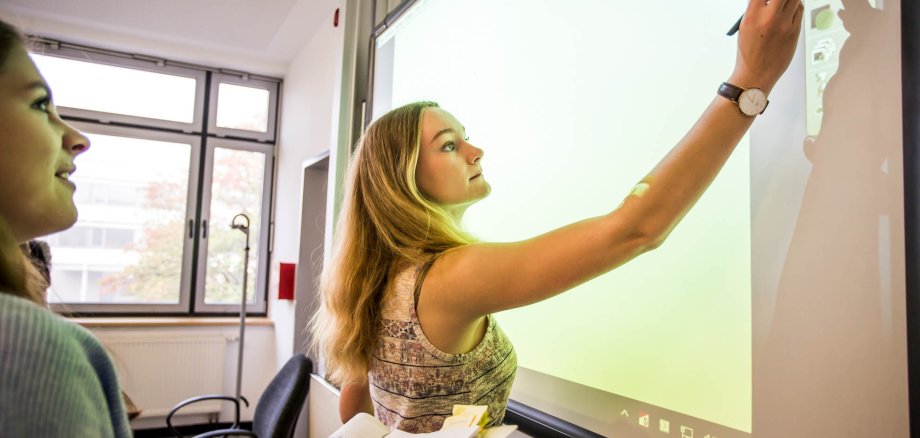District leadership: "Lockdown is a challenge for us all".
The lockdown is a challenge for all of us. Everyone experiences the current restrictions in their own unique way. "The situation is new and unfamiliar for all of us and we have to develop our strategies without having a role model or pattern of action," emphasise District Administrator Dr Reinhard Kubat and First District Councillor Karl Frese. "Of course it would be nice to have a blueprint to follow now, but we have to make our decisions to the best of our knowledge and be prepared to change or readjust if necessary."
Everyone experiences the lockdown twice, on the one hand in their personal lives and on the other in their jobs. For politics, it is currently important to find the right perspective in the sense of a holistic view. One is aware that retail, gastronomy and leisure facilities are currently under enormous pressure to survive, as are the entire cultural sector and many service providers. Government aid is a good approach, but in the long run it cannot replace normal everyday operations, which one hopes can be resumed as soon as possible. "We are confident that the lockdown, which has now been extended until mid-February, with its restrictions, will contribute to a return to more normality as soon as possible," said the district administrator and first district councillor. The development of the infection figures and the incidence rate at least give cause for cautious optimism.
The district leadership is currently paying special attention to the day-care centres and schools, because despite the partial abolition of compulsory school attendance and individualised forms of teaching, it must be ensured that children and young people do not have to accept a break in their education. Ensuring this is one of the greatest challenges in the context of the pandemic and there are definitely deficits for which the district, as the school authority, is not responsible, but which it is nevertheless trying to remedy. The keyword here is the digitalisation of schools.
"Unfortunately, the large providers in rural areas have mainly invested where corresponding profit margins could be expected," the district administrator clarified. "In order to adequately supply the remaining areas with fast internet, we have launched one of the largest European infrastructure initiatives in the municipal sector with Breitband Nordhessen". The district had also intensively advanced the digitalisation of schools in Waldeck-Frankenberg, especially against the background of the pandemic, at least where it was possible for it to do so.
The broadband supply could be improved in 2020 for 37 school locations, in some cases significantly, up to 1 gigabit in download. As one significant example among many, the district administrator mentioned the connection of the Kaulbach School in Bad Arolsen. This was upgraded from 50 Mbit/s to 2x400/40 Mbit/s in November 2020, which has led to a very noticeable improvement. At the same time, it is one of the first schools in the district to have WLAN available across the board as of next Monday. Only Pavilion I with 3 classes on the school grounds had to be completely rebuilt and equipped with new infrastructure. This work will be completed next Monday, 25 January 2021.
In 2021, the remaining 32 school locations will receive an improvement in their broadband connection, of which 19 school locations already have a fibre-optic connection. By the end of the summer holidays on 1 September 2021, all school locations will also have a comprehensive WLAN network on the school grounds. A good 1,750 access points, which will broadcast the WLAN, will then be installed by 10 local craft businesses and connected with appropriate network cables. The school IT department of the district administration will then equip these networks with server technology, activate and maintain them. The district is not responsible for equipping teachers with laptops or tablet computers, but the state of Hesse is. As part of the internal school administration, the district is responsible for equipping the classrooms and subject rooms and the school secretariats.
Within the framework of the emergency equipment programme of the federal government and the state, needy pupils were equipped with terminal devices for the home office. A total of around 1,500 devices were purchased and distributed to the schools in two deliveries. The second delivery has just arrived at all schools and will be handed out to the affected pupils as of now. This means that all the funds made available by the district have been drawn down. "We are endeavouring to create the conditions in all schools to enable comprehensive digitised teaching if required," assure the District Administrator and the First District Commissioner. Of course, we are still far from the optimum at some locations, but that does not justify talking down the situation as a whole. They have already received very positive feedback from many schools.
"Before the crisis, we were in a transitional phase to new technology in the schools; this process has again received decisive impetus from the pandemic and the lockdown and has been significantly accelerated," said the two department heads. "Our goal is to work together with the federal government and the state, which is responsible for the operation of the schools, to have the technologies of the future available in all schools as quickly as possible".
